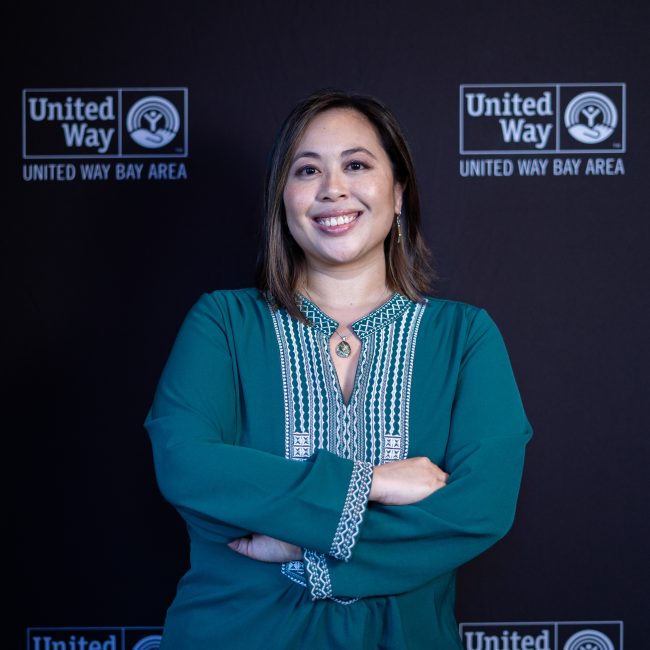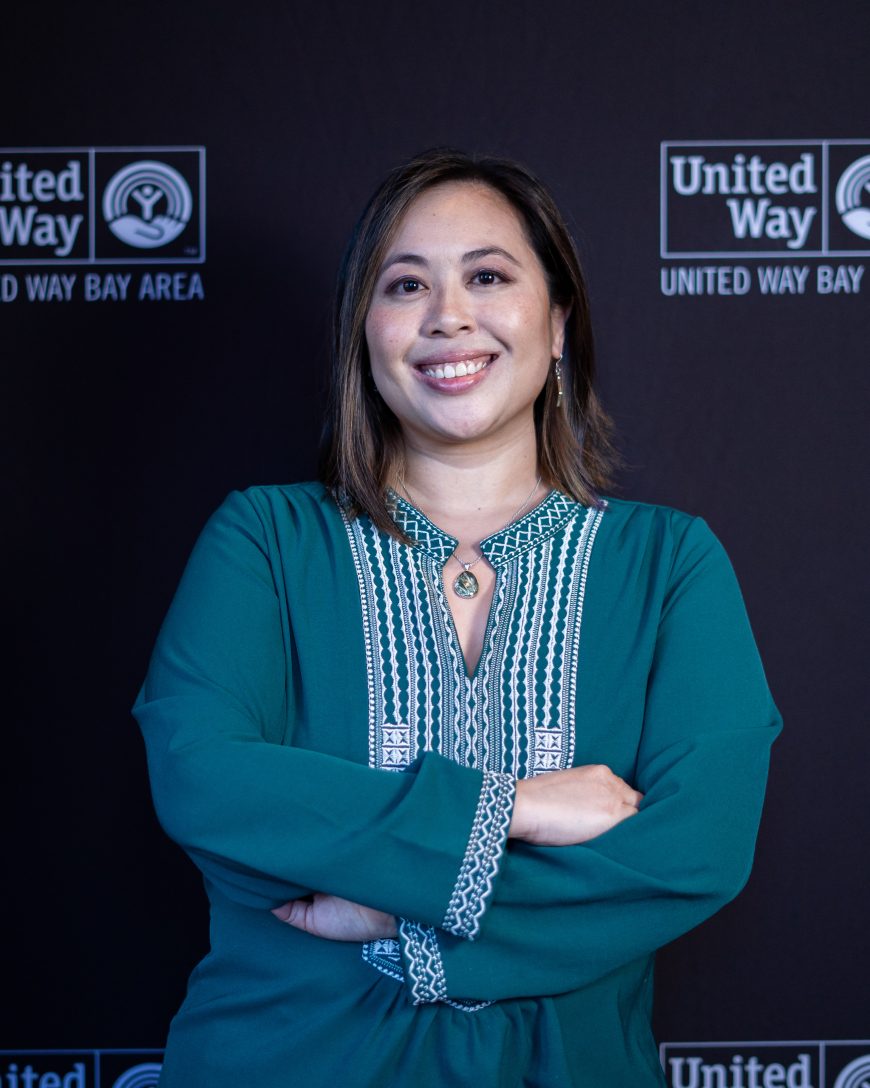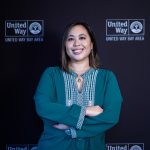Curated conversations with data science for social impact leaders on their career journeys
Pathways to Impact is a series of conversations with data for social impact leaders exploring their career journeys. Perry Hewitt, CMPO of data.org, spoke with Jacqueline Chan, senior director of data and evaluation at the United Way Bay Area, a regional nonprofit that brings together partners from the nonprofit, business, and government sectors to address poverty in the greater San Francisco, California in the United States. She spoke a about her love for scientific exploration that evolved into a commitment to enacting societal change.
What brought you into a career engaged in data for social impact?
It’s been a long and winding road, starting from a love for scientific inquiry as a child. What began with early science experiments has evolved over time to fuse my passion for scientific inquiry with my passion for addressing systemic social injustices. These injustices were evident to me early on, having watched many of my family and friends struggle to break out of poverty.
From early on, I had this vision of becoming a leader in society to enact change in the world. At first, it was through human rights and advocacy, but eventually made my way into public health research and then program evaluation. My early career focused on public health epidemiology where I applied data-driven insights to inform infectious disease control strategies, but I realized that many health conditions were preventable if people had access to resources and environments that met their basic needs. So, I pivoted my epidemiology career towards upstream interventions that ultimately would prevent poor health outcomes. This practice of applying research, systematic inquiry, and collective learning towards social impact was called program evaluation. This career move showed me the pivotal role data can have in transforming the ways in which we solve societal problems. Without research and data, we would lose the ability to constantly learn, improve, and build upon our work.
As data became more prevalent, the opportunities to apply research became greater, with the potential for data-driven insights to play a bigger role in a society and influence its direction.
Jacqueline Chan Senior Director of Data and Evaluation United Way Bay Area
The skills, perspectives, and empowerment that I’ve acquired through this journey have become the stepping stones to give me that privilege to enact the change I have wanted to see in the world since I was young. While my career has been a bit of a winding path of varying experiences, there has been a common thread of applying data-driven insight to community health solutions. As data became more prevalent, the opportunities to apply research became greater, with the potential for data-driven insights to play a bigger role in a society and influence its direction.
What were some of the signs that the time was right to apply data for social impact?
Working in the field on areas like homelessness, international development, and public health, I saw a gap between the great work being done in public health research and the work being done on the ground. The people who were doing the research and the systems development work were not working in tandem with the people who were doing the building, like the frontline workers providing services.
I observed this gap and also a cycle where we were repeating the same thing over and over again, hoping that the problems would vanish. We were doing the same exact intervention in different places. The intervention would fail in a couple of years and then we’d do the same thing in another place or in the same village or community a year later with a different funder. We were falling victim to short-term thinking, seeing ourselves as individual units competing in a resource-scarce world, even though we were all actually working on the same thing in the big picture.
My mission since then has been to fill that gap. The signals showed there was an opportunity for a new data and learning-informed approach that could interrupt that cycle and create long-term solutions.
There has now been a realization that evaluation is actually a really important tool that belongs to the people doing the work. It belongs to the community it impacts.
Jacqueline Chan Senior Director of Data and Evaluation United Way Bay Area
A challenge was that the funding was primarily available for research and directed mostly toward academia. At that time, I worked with local health departments and saw how the infectious disease sector was actively using data to inform immediate action. Based on this experience, I translated those same tools and concepts over to my work in the community and with Engineers Without Borders. We built systems to collect the data, and then gradually changed the culture of how we think about how we do things, using the research actively and translating that data into action.
It’s important to acknowledge the role of community here. We recognize the need to work directly with the community as we decide how to translate research into action. Evaluation is not new in the international development field, but how it’s done and how the data is collected has changed. It’s less often about an outside person coming in to assess how well your project is doing, which will then decide how much funding you’re going to get in the next round. There has now been a realization that evaluation is actually a really important tool that belongs to the people doing the work. It belongs to the community it impacts.
What part of this problem are you seeking to solve with data for social impact? How does that translate into your role today?
During the past twelve years in either public health epidemiology or program evaluation, I’ve been trying to bridge the gap between research and practice. What I now know is that the bigger picture requirement is developing systems change across sectors. As a society, I think we now realize how interrelated all these issues are that we’re all working on, how complex things are getting, and how people and populations are growing and changing. My goal is to work with key change agents in the community to build the tools and processes to help them actively play a role in using data to inform their day-to-day work, as well as the bigger picture. And at the next level, we need to understand that the ways that we work with each other and the ways our work mutually reinforce each other contribute to a collective impact. It’s time we accepted and leaned into our interdependencies.
What were some unexpected blockers to your career entry or career progression?
The first blocker was a mental shift out of the poverty and scarcity mindset. There was a moment when I realized I could play a bigger role in society if I believed in myself and others believed in me, and I worked towards it. This was very different from what I saw many others doing, which was just really focused on individual careers—make enough money, buy a home, survive. It was just really hard to imagine a career, especially earlier on and there wasn’t a lot of money. I needed to broaden my thinking to imagine a path where I could still do what I really wanted to do while surviving and meeting my personal and family obligations. I understand why my family members were so set on survival because it’s really hard in the United States, as well as globally. At the end of the day, for many, life is about survival. I had to think of a way to do both—I was very creative, resourceful, and persistent in my path to get to where I am, with the help of many people who believed in me and supported me.
What helped me to make the shift was talking to people who had that similar realization who were further along in their career. I’ve had many mentors over the years who have given me great insight and advice to break through and change that mindset and perspective over time.
There was another mindset shift: breaking through silos. It broadened my thinking beyond defining my career as working in public health. The problems and solutions expand beyond neat boxes. The real world is messy, complex, and interconnected. I made this shift alongside a community of people—change agents—who were starting to realize that same thing.
What community of people bolsters your work?
There are so many. I’d even go back to the times when I was in middle school; my teachers in middle school and high school were really influential. When a mentor believed in me, that made me believe in myself. Now I mentor others to pay it forward.
There have been times in my journey where I felt alone. Even now sometimes it can feel really isolating and disempowering because change is so slow, and setbacks feel harsh when you’re dedicating your life to this mission. Having peers who are just as passionate helps me; I draw strength from surrounding myself with people who really care about the future and about each other.
Are there specific organizations you belong to that you would like to mention?
I’ve volunteered with organizations like Engineers Without Borders and Get-Us-PPE where I applied my data and evaluation skills to help meet community needs. I’ve also found it helpful to join professional organizations, like the American Public Health Association, and, when I was considering becoming a doctor, the American Medical Student Association. This was helpful in my earlier years because I was surrounded by all these people who were early in their career, too, and truly passionate about the work; we were all just trying to figure out our way.
Now that I’ve narrowed down my professional focus into program evaluation, I’m a part of the American Evaluation Association, where I’m similarly surrounding myself with a mission-focused community, with people doing it in different ways. The broad community at AEA has been affirming, helping me figure out what is different and what is the same with others’ approaches.
I’m currently serving as the Senior Director of Data and Evaluation at United Way Bay Area where I get to work with amazing change leaders and amplify their impact through data-driven insight and community-informed learning processes
To date, one of the greatest barriers to scaling qualitative analysis has been how costly and resource-intensive it was to analyze data. AI is going to be a huge game changer.
Jacqueline Chan Senior Director of Data and Evaluation United Way Bay Area
What non-data skillset do you consider to be your superpower?
Overall, a systems thinking approach has been really helpful. It’s helped me see things and design in a bigger picture, and then that marries well with my technical skills around analysis and evaluation because then I can more easily translate that research into action. Being able to bridge those gaps through my systems thinking perspective has been valuable.
Of course, relationship-building has been critical. There’s value in being able to work with people across multiple sectors: government, academia, nonprofit, frontline workers, and foundations. I’ve worked in many sectors and have been able to interact with and learn to understand a lot of the nuances of the different sectors; that has been my superpower. Building relationships with people and forging connections with people who are different from me has also been a superpower because in this work we have to work with people who are different from us to advance our vision of a better future. We can’t continue working in silos. We can’t insist on our own principles or mindsets as being the right and only way. We have to learn together to work together. It’s useful to remember that I’m a member of a community. I’m a part of this bigger system and so are you, so let’s work together to build a better future in the best ways that we know how. That collaborative way of thinking has helped me.
Part of the Pathways to Impact series
What kind of advice would you offer to someone who’s interested in data for social impact work?
One of the biggest pieces of advice is to get involved. Plug into circles and different local groups that are doing similar things that you’re doing or interested in doing. That’s the first step.
The second is recognizing your strengths, learning what your strengths and weaknesses are and embracing them. That approach is critical, especially for people who have a big vision: we’re going to change the future. If you aspire to make change that will last across generations, you will need to build solutions that can withstand changing times and challenges you may not anticipate. It’s really easy to get into a trap of thinking that you have to do it all, that you have to learn how to be good at everything in order to realize this vision. Recognizing and leaning into strengths and weaknesses is important because that’s the first step in recognizing you’re not alone and you can’t do it alone. You’re going to need other people that you’ll depend on. And that’s okay.
What’s the next big thing that you see in data for social impact? How do you see data being used for evaluation one, or two years down the line?
I see an encouraging movement of evaluation professionals shifting their focus away from just program-level work, and elevating that to systems change and collective impact evaluation. That’s going to be a big shift in the field. Alongside that, I see growth in incorporating culturally responsive and equitable evaluation principles. I think artificial intelligence could be a powerful tool for elevating community voices to inform community solutions. Quantitative data tells only part of the story, and qualitative data helps fill the gaps around community perspectives, context, and experiences that are often lost in research and evaluation. To date, one of the greatest barriers to scaling qualitative analysis has been how costly and resource-intensive it was to analyze data. AI is going to be a huge game changer. I’m excited for the ways AI will allow public sector leaders to quickly gather and integrate community feedback to inform real-time, responsive strategies. I’m very excited to see tools out there already to help interpret the amounts of qualitative data that we need to collect alongside quantitative data to make meaningful data-driven insights. We will need to be mindful of potential biases that AI could unintentionally introduce if we are not careful in how we build and use data tools.
Is data literacy improvement needed for communities to be strong partners in these conversations?
It’s a two-way street. I think the term itself is a little loaded because it assumes people are not literate, but the way that we deliver data is not always accessible. Certainly, we need to build up the capacity of community leaders and local decision-makers to ask the right questions and interpret data meaningfully so they can apply it to their work. However, there is also a responsibility to increase the accessibility of data to its audiences. We need to move beyond presenting a dense research report and involve communities directly in the use of data. In most of my work, I incorporate participatory evaluation approaches where community leaders and stakeholders are a part of the data collection, interpretation, and ultimately the use of the data. Interactive dashboards can also be a useful tool for communities.
Data includes qualitative data — including people’s experiences, perspectives, and opinions. It includes the voices of the community. And so, we also, as evaluators and researchers and data scientists, need to recognize the value of community voices and perspectives alongside quantitative data.
Finally, sharing and changing the power dynamics is also an underlying necessity to improve data literacy.
Can you give an example of a concrete way you could change a power dynamic around an evaluation project in the community?
First, we must treat the community leader as a partner in the evaluation and also an expert in their own community. I come to the table as an expert in evaluation and methods. They come to the table as an expert in their own community. It’s vital to treat each other as equal partners rather than acting like the assessment can be delivered absent community insight.
What’s your ‘don’t miss’ daily or weekly read?
A book I often go back to is “Thinking, Fast and Slow” by Daniel Kahneman — one of my favorites.
And on a regular basis — this sounds really boring! — I am very plugged into my LinkedIn network. I think it harkens back to that idea of surrounding myself with people who are working on this broader mission, but all in different ways. I find the curated LinkedIn feed is my daily read that I review. It’s so hard to keep up with everything, and seeing the work of others is exciting and motivating. Through my networks, I get to learn about new ways of thinking about things or just the latest research on which I can build. The community and their knowledge keep me moving forward despite how hard this work can be sometimes.
About the Author
Perry Hewitt is the Chief Marketing and Product Officer of data.org where she oversees the marketing and communications functions, as well as digital product development.
Read moreSeries
Pathways to Impact
This data.org series interviews leaders in Data Science for Social Impact with a lens of how they got there, as well as the skills and experiences that have fueled their career progression.


